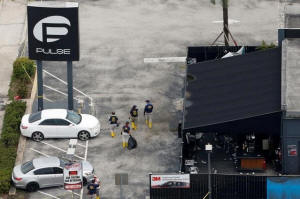|
Fresh details spur debate on police
response to Orlando massacre
 Send a link to a friend
Send a link to a friend
 [June 30, 2016]
By Colleen Jenkins [June 30, 2016]
By Colleen Jenkins
(Reuters) - The release of police dispatch
records offering new details from witnesses of the Orlando nightclub
massacre provided fresh grist on Wednesday for the debate about whether
law enforcement waited too long to take out the gunman.
About three hours passed on June 12 between the firing of the
first shots and the killing of the hostage-taking shooter, prompting
people to ask on social media and in emails to public officials
whether quicker police action could have saved lives.
Orlando, Florida, authorities on Tuesday released new details
including 911 operator notes and text and email messages received by
the police chief whose officers fatally shot the gunman, Omar
Mateen, after he killed 49 people and wounded 53 more.
The call log provides a minute-by-minute account as reported to
emergency dispatchers, offering the most detailed timeline yet of
the incident as it unfolded. The three-hour duration of the episode
was already known.
Some critics said the transcripts showed police should have acted
faster to remove the threat, but others argued they did the best
they could in chaotic conditions.
Retired police sergeant Grant Whitus, who led the SWAT team during
the Columbine High School shooting in Colorado in 1999, believes
Florida officers should have pursued Mateen immediately inside the
Pulse nightclub to "end it right there" before he could take
hostages.
 "How do you negotiate with a terrorist or mass murderer? You don't,"
Whitus said in a phone interview. "The more time you give him, the
more people that are killed."
That view was echoed by critics including Facebook user Chris Byrne,
who said the delay amounted to gross misconduct. "Do I blame the
responding officers? Absolutely not ... I blame their 'leadership,'"
Byrne wrote.
But several experts in tactical training and police performance
cautioned against such judgments. They argued that, based on what is
known so far, the deadliest mass shooting in modern U.S. history
would have been even worse if not for the deliberate response by
police.
"It's always easy to second-guess and hindsight when you have time
to sit and think about things. But when you consider how dynamic
that situation was, their actions undoubtedly saved lives," Thor
Eells, board chairman for the National Tactical Officers
Association, said in a phone interview.
Eells said he has trained SWAT members from the Orlando Police
Department and other law enforcement agencies in Florida, and has
been in contact with officers there since the shooting.
He and two other police veterans said the first officers at the
scene responded appropriately by seeking out the source of the
gunfire and trying to address the threat.
[to top of second column] |

Federal Bureau of Investigation (FBI) officials walk through the
parking lot of the Pulse gay night club, the site of a mass shooting
days earlier, in Orlando, Florida, U.S., June 15, 2016.
REUTERS/Adrees Latif

According to a timeline from the Federal Bureau of Investigation,
officers from various law enforcement agencies entered the nightclub
and exchanged gunfire with Mateen 6 minutes after the initial report
at 2:02 a.m. of shots fired.
By 2:15 a.m., the police dispatch log said the shooter was trapped
in a bathroom. Orlando Police Chief John Mina has argued that
Mateen's forced retreat allowed officers to rescue many people from
elsewhere in the club.
However, other patrons who fled to the bathrooms as the gunfire
erupted were now hostages. Someone in a bathroom whispered "please
help" to a 911 operator and callers advised of victims losing blood,
according to the police log.
The FBI said three crisis negotiation calls with Mateen, ranging
from 3 to 16 minutes, occurred between 2:48 a.m. and 3:24 a.m.
"It's very much a 'damned if you do, damned if you don't'
situation," said Scott Reitz, a former SWAT operator and instructor
for the Los Angeles Police Department. "So many things can go
wrong."
When police learned at 4:29 a.m. that Mateen was threatening to
strap bomb vests onto hostages, they breached a wall of the club for
what would be a final confrontation.
Jim Bueermann, president of the nonprofit Police Foundation, said an
independent review of the incident should be conducted.
"At this point, criticism is unwarranted because we donít have
enough definitive information about what actually happened," he
added.

(Reporting by Colleen Jenkins in Winston-Salem, N.C.; Editing by
Daniel Wallis and Matthew Lewis)
[© 2016 Thomson Reuters. All rights
reserved.]
Copyright 2016 Reuters. All rights reserved. This material may not be published,
broadcast, rewritten or redistributed. |